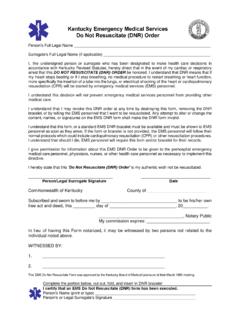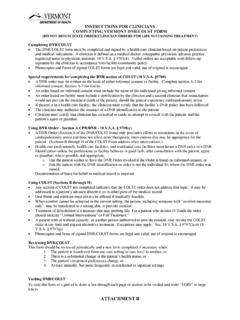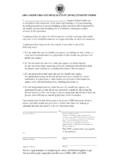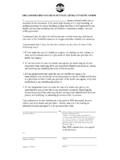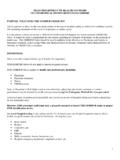Transcription of INFORMATION ON DO-NOT-RESUSCITATE (DNR) …
1 INFORMATION ON DO-NOT-RESUSCITATE (DNR). REQUESTS IN EMERGENCY MEDICAL SERVICES. This summary provides INFORMATION about the types of DO-NOT-RESUSCITATE (DNR) requests that will be honored in the field by paramedics, and emergency medical technicians ( EMTs) on fire engines and ambulances. This INFORMATION will also be helpful to physicians in the hospital if you do not want resuscitative efforts. The best resource for obtaining INFORMATION is your own physician. Once you have read this summary sheet, you may want to write down any questions and discuss them with your family and physician. For general INFORMATION , call Orange County Emergency Medical Services at (714) 834-3500.
2 1. What does DNR mean? DNR means, do not resuscitate , or, do not attempt to restart a heart or breathing once they have stopped. Generally, for paramedics and EMTs to honor a patient's wishes not to have CPR or other resuscitative efforts, a properly completed field DNR form must be present. 2. What happens when paramedics or EMTs respond to a person with a DNR order? If the person's heart or breathing has stopped and there is a valid DNR order, paramedics and EMTs will not try to restart the heart or breathing. The types of treatments that a patient with a DNR order WOULD NOT receive include cardiopulmonary resuscitation (chest compressions and mouth-to-mouth breathing, or CPR), electric shocks to the heart, assisted breathing with mechanical devices, or the use of medications which are intended to artificially start the heart again.
3 A person will not be placed on life support, such as a ventilator or a breathing machine. A DNR order only applies when the heart or breathing has stopped. It does not affect other care, for example before the heart has stopped. 3. What will happen if I am in pain, or bleeding? Patient with DNR orders receive full treatment for conditions like pain, shortness of breath, and bleeding. This is called comfort care. The paramedic or EMT will always provide for patient comfort. An airway obstruction or blockage in an awake patient will be treated. 4. What happens if I decide I no longer want to have a DNR order? At any time, if you decide that you want to receive full treatment ( , CPR), then the DNR order will be disregarded.
4 If you change your mind when the fire department or ambulance arrive, simply tell the paramedics or EMTs that you do wish resuscitative efforts and that they should ignore the DNR order. If you change your mind, it is important to tell your doctor and family your specific wishes, and to request that all copies of your DNR order are destroyed . If you have a MedicAlert do not resuscitate -EMS bracelet, you need to take it off and contact MedicAlert to update your records. 5. What will happen if the paramedics come to my house, begin CPR, and my family members state that I am a DNR patient, but cannot find the written DNR order?
5 The paramedics must continue CPR and use a radio or telephone to contact the doctor, or nurse, who works at the base hospital with the paramedic radio . After the paramedics consult with the base hospital physician, he or she can give orders to the paramedics to stop CPR or may choose to continue resuscitation measures until the situation is more clear. It is important for your family or others to know the location of important documents, such as the DNR order. Some people place INFORMATION about the existence of a DNR order on the outside of their refrigerator. 6. What will happen if CPR is started and then my DNR order is found?
6 Once the DNR order has been identified, the paramedics may stop CPR and all procedures to artificially support life. 7. If a member of my family asks for resuscitation efforts despite the DNR order and my wish for no resuscitation, whose wishes will be followed? The decision regarding resuscitation efforts belongs with the patient him or herself and to no one else unless the patient becomes incapacitated before making clear what their wishes would be. If a valid DNR order exists, that order and the patient's wishes will be followed, unless there is substantial question about the accuracy or validity of the document.
7 Patients have the right to make their own decisions. 8. Do I need to have my family go to the hospital with me? The written DNR order will be followed even if there is no one with you. If they are available, it is important for your family or your assigned decision maker to accompany you to the hospital in case you are not able to make decisions for yourself . It is also important to carry a copy of your DNR form with you to the hospital. 10. What if I live in a skilled nursing facility or a convalescent home? If you have a DNR order in your patient care record or chart, then the paramedics or EMTs will comply with it.
8 Rules about the completion of DNR orders may be different for residents of skilled nursing facilities or convalescent homes. You should speak to the staff if you are a resident of one of these facilities. 11. How do I get a DNR order or other necessary paperwork? It is important to speak to your doctor or home health nurse to assure your understanding of a DNR order. Your doctor or home health care nurse may have the paperwork you need. DNR. forms are available at the Orange County Emergency Medical Services Agency website or you may call at (714) 834-3500. You may also contact the MedicAlert Foundation at (209) 669-2495 or to obtain INFORMATION on a do not resuscitate -EMS bracelet.
9 EMERGENCY MEDICAL SERVICES. PREHOSPITAL do not resuscitate (DNR) FORM. Adapted from a form by the California Emergency Medical Services Agency and the California Medical Association. PURPOSE. The Prehospital do not resuscitate (DNR) Form has been developed by the California Emergency Medical Services Authority, in concert with the California Medical Association and emergency medical services (EMS) providers, for the purpose of instructing EMS personnel to forgo resuscitation attempts in the event of a patient's cardiopulmonary arrest. Resuscitative measures to be withheld include chest compressions, assisted ventilation, endotracheal intubation, defibrillation, and cardiotonic drugs.
10 The form does not affect the provision of other emergency medical care, includ- ing palliative treatment for pain, dyspnea, major hemorrhage, or other medical conditions. APPLICABILITY. This form applies only to resuscitation attempts by EMS providers in prehospital settings - , in a patient's home, in a long-term care facility, during transport to or from a health care facility, and in other locations outside acute care hospitals. The form does not replace other written DNR orders that may be required pursuant to a long-term care facil- ity's own policies and procedures governing CPR attempts by facility personnel.
